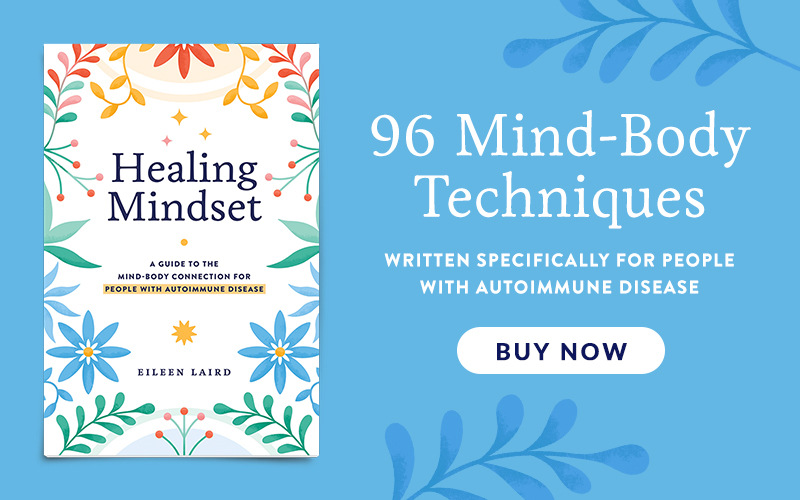
“We have more possibilities available in each moment than we realize.”
~ Thich Nhat Hanh
My Book: Healing Mindset
This blog post is an excerpt from my new book, which is a practical guide to harnessing the anti-inflammatory power of the mind-body connection. Before doing that, you may wonder what you have to gain. Here are 10 reasons to get started today!
1. Less Stress Reactivity
Stress management has two parts: (1) Doing what we can to reduce the stress in our lives as much as possible, and (2) Learning how to manage the stress we cannot control. That’s where the mind-body connection comes in. It allows us to be calmer under duress, and less reactive to the pressures we encounter on a daily basis.
Often when we think of stress management, we only think of the first part, and it is important. Are there items we can remove from our to-do list? Do we ask for help as much as we help others? Can we learn to say no to things we don’t want to do, and make room in our schedules for things that bring us joy? Where can we remove burdens, both small and large?
But the second part of stress management is equally important and often overlooked. There will always be some stress that is beyond our control, and some phases of life contain greater challenges than others. In these circumstances, it’s easy to become overwhelmed and feel that there’s nothing we can do except suffer and “power through.” If you have autoimmune disease, this is risky. Chronic stress increases autoimmune activity, adding to our stress even more, which creates a vicious cycle.
The mind-body connection is incredibly empowering. It’s a way to interrupt that cycle. While we cannot always change our circumstances, we can change how much we react to those circumstances, and that benefits us both emotionally and physically. That’s what this book is all about.
Here’s one powerful example: in a study of women with Hashimoto’s thyroiditis, a stress management program not only led to reduced feelings of stress, depression, and anxiety, it also reduced antibodies.
2. Reduced Inflammation
Inflammation is involved in almost all chronic illness and certainly autoimmune disease. That’s one of the reasons doctors test for inflammatory markers in the blood. Less inflammation correlates with less pain and damage to the body.
While it’s easy to understand that mind-body techniques can reduce stress and promote relaxation, it’s fascinating to learn that they also make biochemical changes. For example, C-Reactive Protein (CRP) is a common test to track inflammation—the higher its number, the higher the inflammation body-wide. Research shows that mindfulness meditation reduces circulating levels of CRP. Not only that, but certain genes in our body ramp up inflammation while other genes tone it down. Mindfulness meditation changes gene expression in an anti-inflammatory direction. How amazing is that?
3. Better Sleep
Sleep is essential to the function of every single part of our body, and lack of sleep interferes with healing, increases inflammation, and puts the immune system into a defensive mode. It’s no surprise that poor sleep is a common flare trigger for people with autoimmune disease. Yet autoimmune symptoms can interfere with sleep, so what can we do? Mind-body techniques can help.
For example, a gratitude practice in the evening has been shown to improve both sleep quality and duration. That improvement doesn’t only apply to people who sleep easily. In one study, this benefit was shown for people with neuromuscular disorders where pain was a common symptom.
4. Improved Digestion
Did you know that digestion starts in the brain? The parasympathetic branch of our nervous system is often called the “rest and digest” system. If we aren’t relaxed when we eat, digestion is more difficult. Being distracted when we eat can interfere with digestion as well, because our brain is being asked to focus on other things. The truth is, very few of us focus on eating anymore. We’re almost always doing something else at the same time, whether we’re watching TV, looking at our smartphones, working, or even driving somewhere. We’re also chronically stressed and often unaware of how that actually feels in our body.
A simple solution is to pause before eating, close your eyes, take a few slow deep breaths, and help your body shift into a more relaxed state. One study found this released even more digestive enzymes than chewing! This doesn’t mean we should stop chewing, but it does show the importance of relaxation to digestive health.
5. Less Pain
Harnessing the mind-body connection for pain relief is similar to stress management in that it has two parts: (1) Reducing physical pain, and (2) Where physical pain can’t be reduced, decreasing suffering by increasing pain tolerance. This doesn’t mean that we learn how to grit our teeth and bear it better. On the contrary, mind-body techniques help us become aware of how we are responding to the pain, physically and emotionally. For example, when we experience pain, it’s natural for our body to tense up, which often creates more pain. Similarly, feelings of anger and despair can intensify the experience on all levels.
One way to dispel both physical and emotional pain is through laughter. I know that sounds strange and even impossible when you’re hurting. There’s nothing funny about excruciating pain. Yet humor can be a form of therapy, and if we seek it out in those moments, we can reap the benefits. Laughter releases endorphins, which are nature’s narcotics.
6. More Willpower for Healthier Choices
Every day, we make choices, and some of those support our health while others add to our health challenges, but it’s not always easy to make positive choices. When we’re in pain or under stress, we tend to reach for traditional comforts, many of which are unhealthy (such as sugar or alcohol). There’s a reason we do this. Stress turns off the part of our brain that focuses on long-term decision making and encourages short-term decisions instead. Cue impulsive choices!
Mind-body techniques can interrupt our stress response in the moment, and also help us change our habits around stress long-term. That’s important because when healthy choices become a habit, they don’t require as much willpower to maintain. They become our new default.
There’s a great deal of research in this area, but let’s use food cravings as one example. They can feel incredibly strong and hard to resist, yet mind-body techniques like Cognitive Behavioral Therapy (CBT) and Emotional Freedom Technique (EFT) have both been shown to have the power to reduce them.
7. Greater Mental Clarity
Brain fog is a common side effect of autoimmune disease. It’s when your brain feels wrapped in fog: you can’t think clearly, your memory suffers, and you can even feel clumsy physically. For some people, this is a daily challenge. For others, it’s intermittent.
One root cause of brain fog is inflammation, so the anti-inflammatory benefits of the mind-body connection already have the potential to help clear the clouds. But there are techniques that can improve focus and attention directly. Mindfulness meditation is especially known for this. This is the practice of focusing on your breath, noticing when you become distracted, and returning your focus to the breath. One study showed that even just 10 minutes daily improved focus and attention.
8. Less Fatigue
This is another symptom that coexists with most autoimmune diagnoses. It can range from mild to disabling, and chronic fatigue syndrome is its own diagnosis. When we’re feeling physically exhausted, it can be hard to imagine that we can use our mind to improve our energy levels. Yet, that’s exactly what we can do.
There are many examples in the research, but let me share one that used guided imagery as an intervention for people with multiple sclerosis. Not only did it improve fatigue, but it also improved overall mood and quality of life at the same time.
9. Improved Relationships
We all know that autoimmune disease doesn’t happen in a bubble. It affects those closest to us as well. While it’s incredibly hard to be the one suffering, it’s also extremely difficult to watch someone you love suffer and feel helpless to change it.
The human brain has a negativity bias. This means we notice what’s wrong more than we notice what’s right. From an evolutionary perspective, this was designed to keep us safe by alerting us to danger. However, in modern life, it constantly triggers our stress response by making everything look very bleak. A gratitude practice works to change that default setting in the brain, helping us see our lives in a broader perspective. Even in our darkest moments, there is usually some beauty if we look for it. In fact, that’s the time we need to look for it the most.
Similarly, this negativity bias also affects how we view ourselves. The voice in our head can be cruelly critical. Self-compassion is the practice of counteracting that voice with a kinder one instead, learning to speak to ourselves as we would an encouraging friend.
What does this have to do with relationships? Both of these practices not only benefit our own bodies and minds, but they can have a ripple effect, benefitting our relationships as well. Research shows that self-criticism is associated with loneliness, lack of intimacy, and marital dissatisfaction. Self-compassion has the opposite influence, increasing emotional connection and communication with those we love. And when a gratitude practice becomes part of a relationship, expressed authentically, it improves the quality of that relationship as well.
10. Better Health
Let’s finish with the big picture. Just as stress can exacerbate symptoms and prolong recovery, mind-body techniques have the potential to do the opposite. One example is expressive writing, defined in the research as writing focused on a traumatic or difficult experience.
I’m someone who has always kept a journal, ever since I was a teen. It doesn’t mean I write in it every day, but I always use it as therapy during tough times. Writing things down helps me let go of difficult emotions more easily than speaking them aloud, and I also seem to gain a clarity and perspective I don’t get otherwise. It turns out that this practice offers physiological benefits as well.
The first study into expressive writing was done in 1986, and it led to improved health outcomes in college students, shown by fewer visits to the health center. In a 2011 study of rheumatoid arthritis patients, expressive writing led to reduced pain, greater grip strength, and faster walking speed.
+ Bonus Benefit: Hope
With chronic illness, life sometimes feels hopeless. This research offers inspiration instead. I intentionally highlighted a wide variety of mind-body techniques across the different benefits, to give you a sense of what’s possible. However, I don’t want you to think that each one is exclusively connected to one benefit. For example, meditation isn’t the only way to reduce inflammation, and gratitude isn’t the only path to a good night’s sleep. There are thousands of studies, and I didn’t have room to share them all in this chapter.
All mind-body techniques have the power to benefit our bodies in countless ways. And while it’s fun to peruse the research, in the end what matters is what works for you. That’s why I value self-experimentation above all else. Pay attention to how these techniques impact your unique body. My goal is to help you find your own favorite methods, the ones that give you the best results. Are you ready to get started? Buy Healing Mindset today.
You May Also Be Interested In









